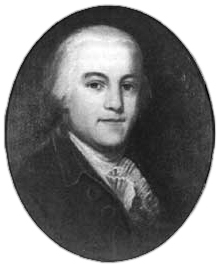Edward Rutledge
| Edward Rutledge | |
|---|---|
 |
|
| 39th Governor of South Carolina | |
|
In office December 18, 1798 – January 23, 1800 |
|
| Lieutenant | John Drayton |
| Preceded by | Charles Pinckney |
| Succeeded by | John Drayton |
| Member of the South Carolina Senate from Charleston | |
|
In office November 28, 1796 – December 6, 1798 |
|
| Member of the South Carolina House of Representatives from the St. Phillip's and St. Michael's Parish | |
|
In office January 6, 1783 – November 28, 1796 |
|
| Member of the South Carolina General Assembly from St. Phillip's and St. Michael's Parish | |
|
In office March 26, 1776 – October 17, 1778 |
|
| Delegate from South Carolina to the Continental Congress | |
|
In office 1774 – 1776 |
|
| Personal details | |
| Born |
November 23, 1749 Charleston, South Carolina, British America |
| Died | January 23, 1800 (aged 50) Charleston, South Carolina, U.S. |
| Resting place | Saint Philip's Episcopal Church Cemetery, Charleston |
| Political party | Federalist |
| Spouse(s) | Henrietta Middleton Mary Shubrick Eveleigh |
| Religion | Episcopal Church |
| Signature | |
| Military service | |
| Allegiance |
|
| Service/branch | South Carolina militia |
| Years of service | 1778–1781 |
| Rank | Captain |
| Battles/wars | |
Edward Rutledge (November 23, 1749 – January 23, 1800) was an American politician, and youngest signer of the United States Declaration of Independence. He later served as the 39th Governor of South Carolina.
Like his eldest brother John Rutledge, Edward was born in Charleston. He was the youngest of seven children (5 sons and 2 daughters) born to Dr. John Rutledge and Sarah Hext. His father was a physician and colonist of Scots-Irish descent; his mother was born in South Carolina and was of English descent. Following his brothers John and Hugh he studied law in London at the Inns of Court. In 1772 he was admitted to the English bar (Middle Temple), and returned to Charleston to practice. He was married on March 1, 1774 to Henrietta Middleton (17 November 1750 – 22 April 1792), daughter of Henry Middleton. The couple had three children;
Rutledge had a successful law practice with his partner, Charles Cotesworth Pinckney. He became a leading citizen of Charleston, and owned more than 50 slaves.
During the American Revolution Rutledge served along with his brother John representing South Carolina in the Continental Congress. He worked to have African Americans expelled from the Continental Army. Although a firm supporter of colonial rights, he (as a delegate) was instructed initially to oppose Lee's Resolution of independence; South Carolina's leaders were unsure that the time was "ripe." At age 26 he was the youngest delegate to sign the Declaration of Independence.
...
Wikipedia
